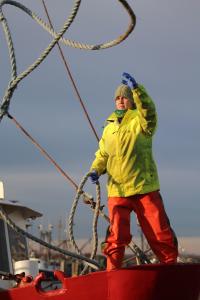Tori Thomas

Young Fishermen in the Northeast United States
Interviews with 39 fishers between the ages of 18-35, located along the US East Coast from Maine to North Carolina. Collectively, they represent a wide variety of gear types and fisheries. All had been fishing full-time for at least two years and wanted to make fishing their career. They describe motivations for choosing a fishing career, strategies used, barriers encountered, and facilitating factors that have enabled interviewees to defy the graying trend to become successful fishermen.
Please visit the Voices SoundCloud page to explore clips and stories that relate to this collection.
Sarah Schumann
Tori Thomas, 29 years old at the time of the interview, is a deckhand in Point Judith, RI. Despite growing up far from the coast with no exposure to fisheries, she got a job as a fisheries observer after college, and then decided to try her luck as a deckhand.
Scope and Content Note
In this interview, Tori discusses her career as a commercial fisherman and reflects on her journey in the fishing industry. She discusses how she started as an at-sea biologist in 2013, working with the observer program for a company called MRAG Americas. She acknowledges the challenges of being a woman in a male-dominated industry but embraces the uniqueness of her career choice. She discusses proving herself through her work and skills and being a positive representation of what women can achieve in the field. Tori also discusses the misconceptions and judgments people have about commercial fishing, emphasizing the importance of educating others about the industry and the value of local seafood.
Tori talks about finding fulfillment in a career choice that is unconventional for someone with her background: "I just knew that I needed to be connected to something. In order for me to provide my best work and put my best foot forward, I needed to feel a sense of connection. Working on the water provided me that connection. I think that throughout our life, our purpose changes. Adapting to the person we want to be, our purpose changes. Moving forward and looking back, telling future generations that you were out there doing everything that most women don’t get the opportunity to do—and it’s like, they can! We can! I think part of being fulfilled and feeling fulfilled is knowing that you’re doing something different than the regular late twenties-early thirties woman. If you think about it, most people are married and have families in their late twenties. I never felt myself being complete with that."
Please Note: The oral histories in this collection are protected by copyright and have been created for educational, research and personal use as described by the Fair Use Doctrine in the U.S. Copyright law. Please reach out Voices@noaa.gov to let us know how these interviews are being used in your research, project, exhibit, etc. The Voices staff can help provide other useful resources related to your inquiry.
The NOAA mission is to understand and predict changes in climate, weather, oceans, and coasts, to share that knowledge and information with others, and to conserve and manage coastal and marine ecosystems and resources. The Voices Oral History Archives offers public access to a wide range of accounts, including historical materials that are products of their particular times, and may contain offensive language or negative stereotypes.
Voices Oral History Archives does not verify the accuracy of materials submitted to us. The opinions expressed in the interviews are those of the interviewee only. The interviews here have been made available to the public only after the interviewer has confirmed that they have obtained consent.
